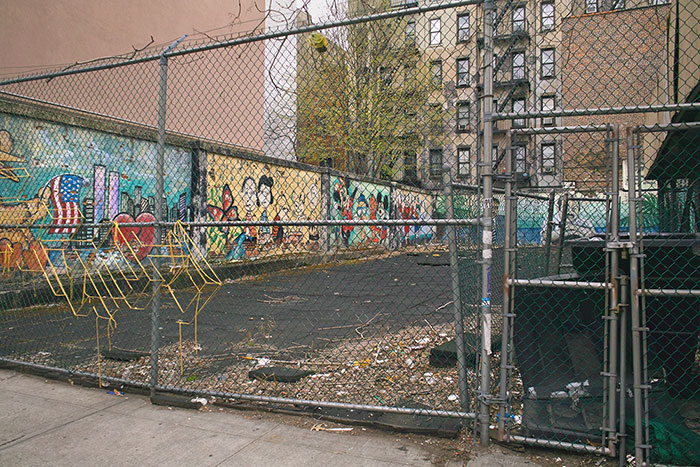 Norfolk Street, Lower East Side — © Brian Rose
Norfolk Street, Lower East Side — © Brian Rose
I was in Boston Thursday evening when the marathon bombers ran amok. Well… not physically. But I witnessed the events as they unfolded in a most unexpected, vividly surreal way.
I was fascinated by the attempts of the public to find the bombers amidst the crowd near the finish line of the Boston marathon. Amateur sleuths were reviewing dozens of photographs available on the internet, engaged in a real-life version of “Where’s Waldo,” except that Waldo wasn’t in red and white stripes. He, and his likely accomplice, were supposedly carrying black and silver backpacks big enough to contain pressure cooker bombs.
The crowd source detectives had managed to identify a number of suspects, all innocent as it turned out, and the New York Post had run one of the photos on their front page essentially fingering two young men in the crowd as the bombers. They were the wrong guys. Adding another black mark — if it’s even possible — on the shameful record of Rupert Murdoch’s odious tabloid. On Thursday the FBI cleared things up by releasing video and photographs of the actual bombers who were still at large.
I wanted to see how things were playing out on Reddit, the social media site with a group actively combing through the Boston crowd photos. It was after 9pm and I was reading the comments on Reddit, when suddenly, someone wrote that the bomber’s address had just been given out on the Boston police scanner. I tuned in, which is easily done on the internet, and began listening to the mostly tedious back and forth between police officers and dispatchers. Though nothing more came up about the address, for some reason I kept listening while continuing to read commentary about the photos.
At around 10:30 an anguished voice punctuated the static — “officer down!” — and then a few minutes later I heard the strangled cries for help from the MIT campus in Cambridge. Having no idea that it was related to the marathon bombers I continued to listen as the police rushed to the scene and began searching the subway and the surrounding streets. It was obvious that something dramatic and highly unusual had occurred in this normally placid college town.
And then, a short time later, the initial report of a carjacking, the pursuit of the stolen car, “shots fired, shots fired,” explosions, calls for “long guns” and “gold cars.” It was pandemonium, as one police cruiser after another notified dispatch that they were headed for the scene. I listened deep into the night as the police began setting up a search perimeter and a command post. By then, it was clear that the carjackers were indeed the fugitive bombers, and I went to bed knowing that one of them was dead and the other at large in Watertown, the community adjacent to Cambridge.
None of this raw and riveting information came from TV news or the websites of major media like the New York Times. I was one of a relatively small number of people — tens of thousands certainly — but small in country of over 300 million who witnessed in real time the dramatic events of that evening, listening through the cross talk, the cryptic jargon, the Boston accents, unfolding on the police scanner.
There will be a lot of discussion about how things were handled — to my ears, the police were amazingly calm and professional under the most extreme circumstances — and whether we, the public, should be permitted to hear things from the inside in the future. For me, it was a unique, unforgettable experience, unfiltered by the bobble heads of TV news. I’m still thinking about it, but my initial feeling is that having access to the police scanner was more help than hindrance.
I was there.
Amazing how the web works well as an access point for observation and monitoring events in real time but l as a tool for analysis and discovery – not so well. The false sense of control offered by the phony master control portal of cyberspace lets armchair detectives and day traders play god and be suckered deeper into the vortex of tech consumerism. A mob is a mob is a mob.